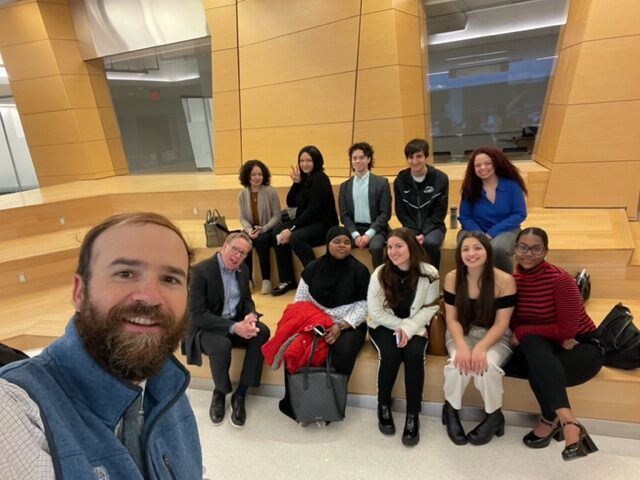In May 2022, Malak Badeer graduated from the Master’s in Human Resources Management program. That same month, she shared publicly with the SCS community her brave story of overcoming the tragic loss of her husband, Hamza, who passed away months after the birth of their first child, Omar. Four months into the pregnancy, Malak and Hamza suffered a severe car accident that led to hospitalization and intensive rehabilitation. Malak persisted in her studies, however, and achieved her dream of graduating from Georgetown. In the next several weeks, Mission in Motion will dedicate attention to the season of Commencement and its milestone events and celebrations, including the Spirit of Georgetown award at the Tropaia ceremony. In preparation for Commencement, a time of “sending forth,” we sat down with Malak for an interview that explored her transformative personal story, the meaning of her Georgetown education, and the advice she would like to give to this year’s graduating class.

- Last year, you shared with the SCS community your own story of personal loss and adversity. What inspired you to do that?
Sharing my story with the SCS community wasn’t easy. The inspiration to share my loss and adversity came after an immense amount of thinking and resentment toward the idea. Initially, I was very hesitant because I did not want to receive pity for my story. I did not want people to feel bad for me or sorry for anything I had to endure. I wanted to share my story with the only intent of shedding light on the reality that life will hit us so hard at times, and it’s up to us to keep moving forward. I want students like me who may be between the decision of giving up or finding the internal strength within yourself to continue moving forward. I invite you to continue moving forward by seeking the support of others, including all the resources in your community.** For instance, for students at Georgetown, the Every Hoya Cares microsite is a good place to start in terms of the supportive resources available. We all have our struggles and obstacles throughout our lives, and some just come a lot sooner than later, and at times we expect them to happen the least. It’s what we do when we’re facing those struggles that matter. I am sharing my story in this public way because I want others to know that seeking help from others is what helped me keep going and move forward.
- In preparation for Commencement, what are your reflections on this season of graduation? What stands out for you one year after your own graduation?
I can reflect on this graduation season and say, “I did it.” I overcame those obstacles, and I did it, and I’m so happy that I did. One year later, I began my career in a global organization that feels like home with a manager that I wish for every single one of you. One year later, I was lucky enough to join an organization that embraced me and made me feel at home and wanted to see me flourish alongside a manager who goes above and beyond to ensure it happens. One year later, what stood out the most was that all these difficulties passed, and they finally didn’t weigh as heavy anymore. I hope it reminds all of you that there’s a light at the end of every tunnel.
- What advice would you like to share with students who are preparing to graduate and conclude their time as students at SCS?
As you conclude your time here at SCS, I want you to know that life will test you in many ways. It will break you and shake you to your core. But I want you to rise above those tests and conquer them with the help of others and understand that your own internal strength in adverse times comes from the community that surrounds you. Do what it takes to be the best version of yourself. Life is too short. My late husband passed with a dream, a dream to take control of his own life, and as he was reaching that dream, he did not make it. So please, live your life and refuse to have anybody in this world compromise your freedom to live out your true calling.
- How is your Georgetown education shaping the next steps in your professional journey?
Georgetown began shaping the next steps in my professional journey even before graduation. The quality of knowledge and education I received from my mentors, professors, and educational materials are all quality resources I wouldn’t trade for the world but rather things I would repeatedly go back to for reference over again. If I could take a class every semester for the rest of my life, I would. Knowledge is power, and it’s the building block to shaping our future. I have been able to contribute so much of my knowledge from Georgetown and transform my current business line in many small but effective ways through the power of education that Georgetown University has provided for me, from conducting employee engagement activities within my team and creating a more positive work environment to creating forums to help support colleagues with simplifying team necessities and future goal planning. **Editor’s Note: May is Mental Health Awareness Month and a good reminder to all in our community about Every Hoya Cares, a comprehensive set of resources to assist with mental well-being and connection. You are not alone in your journey at Georgetown.


